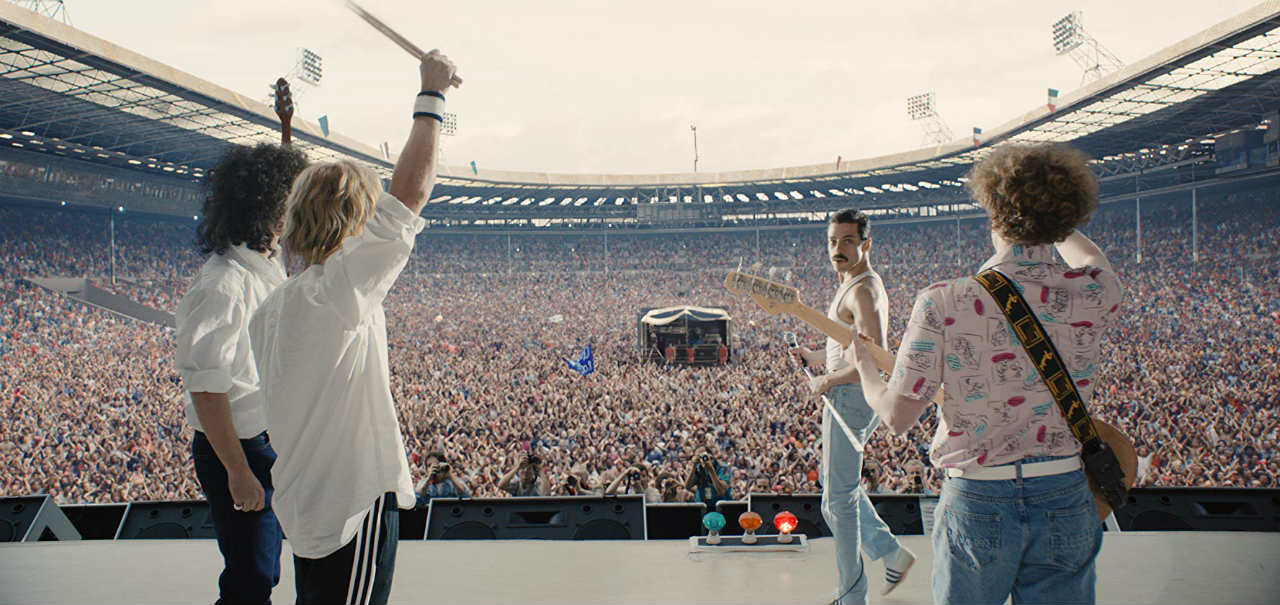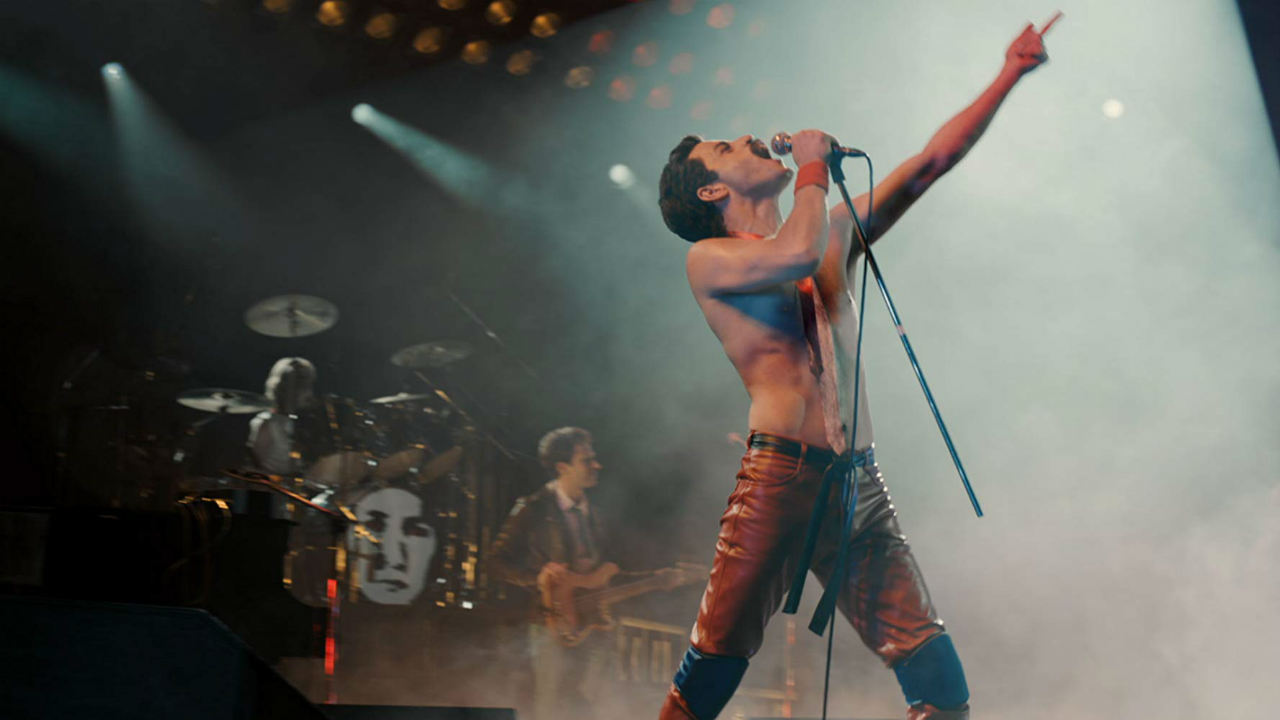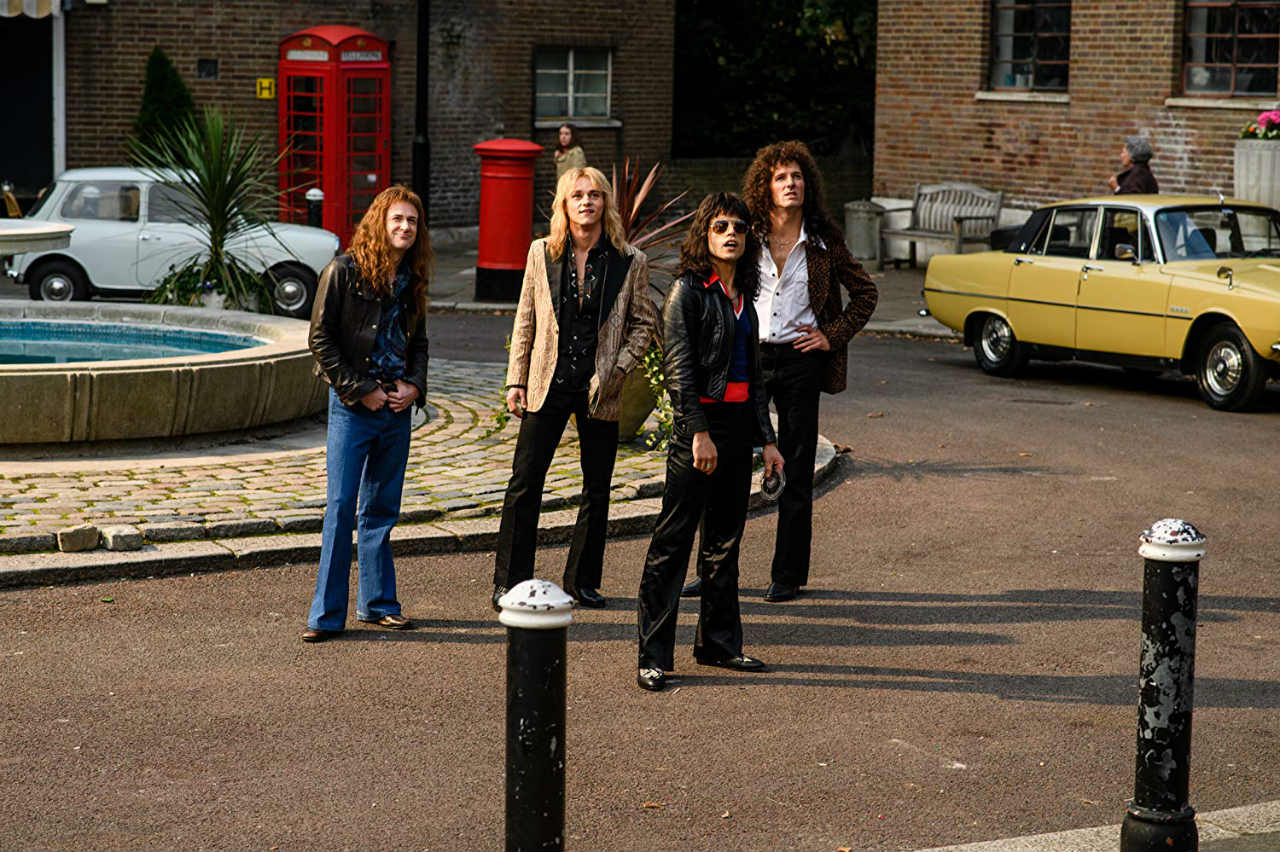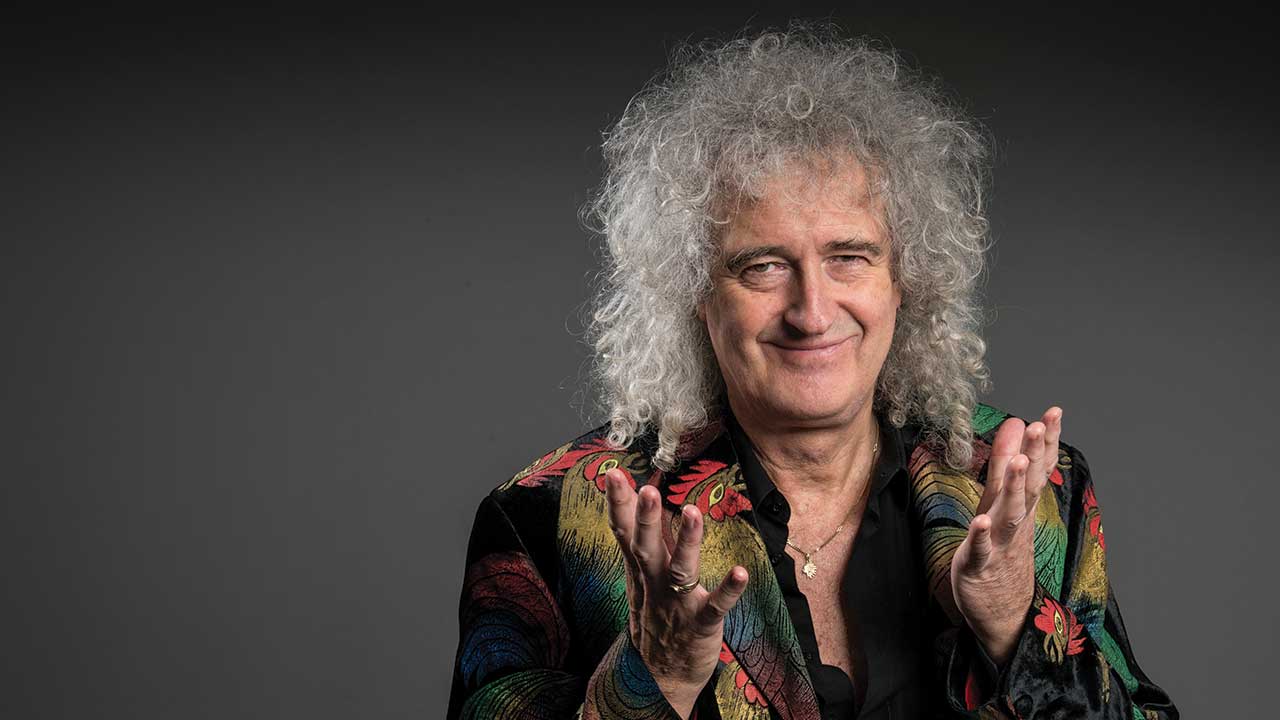Brian May can laugh about it now: the fired directors, the departed leading men, the eight agonising years when the Freddie Mercury biopic, Bohemian Rhapsody, crawled through production, up among the leaders in the bad-luck stakes. “I think the best thing is to look forward, and not back,” the ever-diplomatic Queen guitarist considers when asked for his crowning head-in-hands moments.
At last, Bohemian Rhapsody is here – and despite that difficult birth, early signs suggest it’s one of the best rock biopics of recent times. From the forensic detail of the sets and costumes, to a soundtrack that takes in unreleased live tracks, this is a time machine for Queen fanatics. But it would be nothing without the lead performance of Rami Malek, whose note-perfect turn is the puzzle piece that May never thought they’d find. “He absolutely smashed it,” the guitarist says.“It’s not enough to look the part. He inhabits Freddie.”

Brian May interview: Bohemian Rhapsody, Queen's history and getting the project finished
Did you ever think that this project wouldn’t make it?
Oh, there were about a thousand moments when we doubted it was going to get made. It was a very bumpy ride, but that’s the way life is sometimes. Things are not always straightforward, and perhaps in the end they’re better for it. In a way it mirrors the actual history of the band. We hardly had a smooth path in Queen, but some of those moments of adversity do make you stronger, and it’s the same for the film. I wouldn’t even hesitate to say I think it’s wonderful.
How do you feel when you watch it – happy, sad, nostalgic?
All of that, yeah. Joy and horror and sadness and all those big emotions. I’ve seen it hundreds of times now, in fragments and eventually coming together, and it still gets me, I must say. It’s very emotional. It’s all about Freddie. Yes, we are in there, but the story is about Freddie and that was always the aim. Obviously Freddie is so precious to us. One of the great breakthroughs early on was [screenwriter] Peter Morgan saying: “This is a film about family.” It’s about all the stuff that happens in a family – some good, some bad, the going away, the searching for independence and then the nurture of the family. It’s a film about that stuff, on one level, and then it’s about Freddie’s emerging talent, his amazing resilience and sense of humour.
The film ends with Queen playing Live Aid in 1985. Was there a temptation to go beyond that?
No. I think there’s a natural culmination there. And that has pretty much always been the case, from the earliest scripts. We felt that was the pinnacle – despite what some people have said in the press, who know fuck-all about it. Somebody who shall be nameless said: “Oh, they’re going to portray Freddie dying in the middle of the movie, and then the rest of it is gonna be about life without Freddie.” Well, complete bullshit. This is all about Freddie, and I think Live Aid is a good point to leave it. Who knows, there might be a sequel [laughs].
Was playing at Live Aid one of the best days to be a member of Queen?
It was an amazing moment. And pretty much unexpected, because we were the last band to be booked on the bill, and it was all sold-out before we were even announced. So we knew it wasn’t a Queen audience, and we went on not expecting much, feeling a bit like the outsiders. To see that response was mind-blowing. And you’ll see that in the film – and from our point of view, too, which is what you can’t get from a documentary. You’re looking at a fantasy recreation, but it’s astonishingly real.

Brian May interview: Finding the right Freddie
Finding the right person to play Freddie was always going to be a nightmare, wasn’t it?
I think we all thought it would be difficult. At some points we thought it was impossible. But along came Rami, and we had a great feeling immediately.
I suppose if Sacha Baron Cohen had kept the lead role, you’d never have found Rami?
Well, that was a near-disaster. I think we realised just in time what a disaster that was going to be. And it actually wasn’t rocket science to figure that out. But yeah, that’s one of the rocks that we nearly hit. I think we were all nervous in the beginning, when the casting process was going on. Because yes, that’s a real tough thing to contemplate – somebody playing the part of you. The guy who plays me, Gwilym Lee, I spent a lot of time with him, so he understood me. He’d be picking up my mannerisms and what makes me tick. So when Freddie and me are in the studio, confronting each other, it’s very real. Some of it was improvised, but they did it with the knowledge that they understood us from the inside out.
Is it an entirely flattering portrayal of Freddie, or does it show his flaws, too?
Yeah, it shows everything. Nobody thinks Freddie’s perfect, but he sure was unusual. You see it all. Not in a gratuitous way. It’s not meant to be messy and licentious, and I think that was a good decision.
But it’s not a druggy rock movie?
No. It didn’t need to be. All that stuff is in there. But you don’t need to be revelling in scenes of debauchery. Not that Freddie was particularly debauched anyway. I know some people were looking for that. But no, it’s a film which portrays the truth, in a fairly gritty and honest but also entertaining way.

Do you think Freddie would have approved of and liked the film?
I do. I think he would have felt it was a fair cop, really. It shows all his greatness and all his fallibility and insecurity – the whole bit. I think it shows him very truthfully and not sycophantically, but in a way that appreciates his talent. Because he was sure was unique. I’ve never met anybody like Freddie in my life, before or since, and it’s probably not going to happen again.
Do you think Freddie could have been a good film star?
No. He didn’t have the patience. He was offered a residency in the West End at one point, and he said: “Yeah, I’ll do it. How many shows a week?” They said: ‘Eight.” And he said: “I’ll do a couple.” He didn’t like repeating stuff. Patience was not one of Freddie’s virtues. I think he would have found it difficult turning up every day on the set. I don’t think that would have lasted long [laughs].
Which is your favourite scene in the film?
My favourite Rami moment is when Freddie is plucking up the courage to tell us he’s going off to do his solo album. It’s a wonderful piece of acting – and a lot of that wasn’t in the script. And when I watch it I feel that is so Freddie. He’d talk quietly, puff on his cigarette, not want to come out with the words. Eventually he did it – in a very cut-and-dry manner. But you can see the angst inside. That scene nearly got cut from the movie – that’s a little secret – just because there’s always this pressure to make things shorter. But we fought for that scene to stay in, because the realism of it is quite gut-wrenching. That was a difficult moment for us. It’s Freddie kinda leaving his family.
You’ve also updated your Queen In 3-D book with exclusive photos from the film set. What was it like being there?
Various different emotions, really. In the early days with [director] Bryan Singer, it was very taut and tense, and I didn’t feel some of the time that I ought to be there – I felt like I was interfering in the process. But nevertheless I was, and I took the camera and captured some moments in the shooting. In the latter part, when Dexter Fletcher took over the direction, it was like a different universe, with everybody very jolly and relaxed. I think the movie benefits from both regimes; it has a very serious undercurrent, but also has some lightness, a lot of real joy and fun.

Brian May interview: Satisfying fans and striking a balance
Do you think the film will satisfy the hardcore Queen fans?
Yeah, I think it will. It satisfies us. It makes us feel something. There’s a lot of incredible detail. All our technical people were involved, so if you look around at the guitars and amps you see on stage at Live Aid, you’ll see they’re pretty damn perfect and correct. And the guys who built the Live Aid set itself [for the film] were the guys who built the original. Of course, there’ll always be things you can find fault with. There is no such thing as a perfect film, and Queen fans will understand when they see it that certain things have been moved around for the story to make sense. You can’t collapse forty years of a person’s life into two and a half hours without cutting out a lot of stuff.
I heard that even Roger Taylor’s socks are period-correct.
I don’t know about the socks. To be honest, not all of the clothes are exact reproductions by any means, but the significant details are pretty much there. Once the film was in motion, it was not our film any more, it was Fox’s film. They were paying the bills. So we certainly didn’t go into the studio and tell people what to do. If there was something which really rankled – something that was obviously not right – then we would say it very quietly to the director and let him sort it out.
Did you really play your Red Special guitar with a violin bow, like in the film trailer?
No. The funny thing is, the trailer people work from film stock which is their own. So a lot of what’s in the trailers is not in the movie. The scene with me and the bow was shot as part of a bunch of experimental things. We weren’t there for the shoot. And when I saw it I went: “No, that’s not what happened. And don’t let’s even pretend it happened, because that’s a Jimmy Page thing, that’s not me.” But the trailer people liked it. That’s all I can say. But no, you won’t see that in the movie.
The soundtrack includes your unreleased Live Aid set, doesn’t it?
Yeah. There’s some good live stuff, some of which hasn’t been on albums before. But also, there’s some of the early stuff that wasn’t recorded at the time. For instance, Freddie coming to see me and Roger play as Smile. That’s all depicted in the movie. And we were able to recreate some of those bits of music, which was a lot of fun. Tim Staffell [Smile vocalist] actually came in and recorded it with us, so on the movie soundtrack album there’s a Smile track [Doing All Right].
Do you think you could you handle being part of the Hollywood machine in the longer term, or would that life eventually give you a nervous breakdown?
Well, it’s funny what you can adapt to. You can enjoy being a part of it for a while, but it’s heavy duty. The figures – in terms of money – are a hundred times bigger than what we deal with every day. It’s a different world. And the amount of wastage is incredible. But a lot of wonderful things happen. And I think there’s some magic in this film.
Bohemian Rhapsody is in cinemas now. Queen In 3-D: Updated Edition by Brian May is published by The London Stereoscopic Company.

